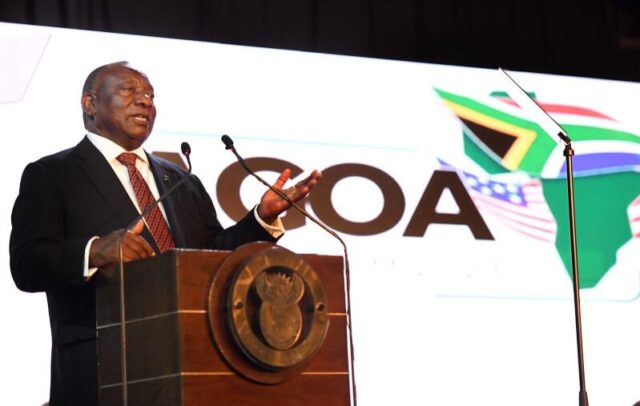President Cyril Ramaphosa has warned that countries in the sub-Saharan African region would lose out more than South Africa would if the duty-free trade benefits under the multimillion-dollar Africa Growth and Opportunity Act are withdrawn from Africa’s most advanced economy.
COUNTRIES in the sub-Saharan African region would lose out more than South Africa if the duty-free trade benefits under the multimillion-dollar Africa Growth and Opportunity Act (Agoa) are withdrawn from Africa’s most advanced economy.
This was the rallying cry of many delegates, including President Cyril Ramaphosa, at the 20th Agoa Forum, which came to an end on Saturday in Johannesburg.
South Africa’s ongoing eligibility for expanded duty-free access to US markets through Agoa has become uncertain in recent months following the government’s geopolitical stance concerning Russia and the war in Ukraine.
Agoa provides eligible sub-Saharan African countries with duty-free access to the US market for more than 1,800 products, in addition to the more than 5,000 products that are eligible for duty-free access under the Generalised System of Preferences programme.
While all 35 eligible sub-Saharan African countries benefit from Agoa, Kenya and Lesotho have some of the highest Agoa utilisation rates, with 88% percent of Kenyan exports and 99% of Lesotho’s exports to the US qualifying for zero-tariff treatment.
Speaking at the opening of the forum on Friday, Ramaphosa said data showed the programme had substantially improved the export competitiveness of certain African products, especially textiles and apparel.
He said South Africa’s auto exports to the US under Agoa have contributed to job creation in South Africa and in the auto supply chain within neighbouring countries.
He said South African automotive companies sourced leather car seats from Lesotho; wiring harnesses from Botswana; copper wire from Zambia; rubber from Côte d’Ivoire, Nigeria, Malawi, Ghana and Cameroon; and steering wheel components from Tunisia.
These were installed in vehicles that are exported to the US under Agoa.
“These inputs alone accounted for more than $200 million (R3.8 billion) worth of products traded among African countries,” Ramaphosa said.
“In this respect, Agoa makes a vital contribution to regional industrial development and the integration of African economies.
“This is critical to building Africa’s productive capacities, increasing value-addition per capita, as well as diversifying trade beyond the reliance on commodities.”
One of the most-discussed topics at the forum was African trade ministers wanting the US Congress to push for the re-authorisation of Agoa as early as in January next year.
US President Joe Biden last week announced the removal of Agoa beneficiary status from Uganda, Niger, Gabon and Central African Republic, effective from January 1 next year.
Another fiercely-debated issue was the future of Agoa, which as it is due to expire on September 30, 2025.
Zingiswa Losi, president of the Congress of SA Trade Unions (Cosatu), which took part in the inaugural Agoa Labour Forum, said they have been campaigning for the extension of Agoa beyond 2025.
“The reason why we were on a campaign trail with the minister of trade and industry is the appreciation and understanding that if South Africa were to exit from Agoa, it would not only be a devastating blow to local jobs in South Africa, but also to the jobs throughout the region, and also it would add pressure to the already unmanageable migration flow to South Africa from the continent,” Losi said.
At the conclusion of the forum on Saturday, US Trade Representative Katherine Tai said there was commitment on both sides to strengthen Agoa and explore additional areas of cooperation and other trade tools to complement the Agoa relationship.
“A lot of what we discussed over the last three days was precisely on this topic,” Thai said.
“Making the programme more effective and relevant to today’s challenges, like growing inequality and the climate crisis. Improving usage by smaller African economies so they too can share in the benefits.”
The potential challenge to South Africa’s Agoa participation during the next review hinges mainly on a specific provision within US law, which stipulates that beneficiary countries should refrain from activities that could undermine US national security or foreign policy interest.
US Senator Jim Risch, a Republican representative from the State of Idaho, has already written to Thai and US Secretary of State Antony Blinken, saying South Africa’s relationship with Russia, and most recently with Iran and Hamas, undermined necessary eligibility safeguards in the Agoa statute.
Anchor Capital’s investment analyst Casey Delport said on Friday that while the risk of complete expulsion was small, even if South Africa lost its Agoa trade privileges, the overall direct macroeconomic impact would be limited, as most of South Africa’s exports to the US already had a zero or nominal duty under the Most-Favoured Nation regime.
However, Delport said the removal from Agoa might bring about a more significant, indirect consequence by jeopardising trade support services and negatively affecting investor and business confidence.
“First, should South Africa’s Agoa eligibility be revoked, the overall trade volume within Agoa significantly contracts, reducing its standing as one of the US’ foremost economic and diplomatic instruments for maintaining relationships across sub-Saharan Africa,” Delport said.
“Second, denying South Africa access to Agoa would adversely affect several smaller regional neighbours with strong ties to industries that derive the greatest benefits from SA’s Agoa exports, creating a ripple effect in the region – an issue raised in the 2015 review.”
– BUSINESS REPORT







